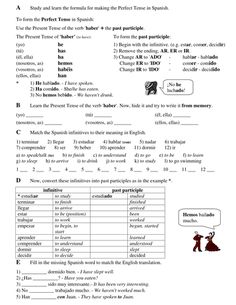
We use pretérito perfecto because it is a completed action that has happened in a time that is still considered the present – this week. This week, my parents have called me 3 times. We use pretérito perfecto because we are describing an action that has started in the past and continues until the present Sara continues to live in London.Įsta semana mis padres me han llamado 3 veces. Some irregular past participles, participios pasadosīelow are some examples of the perfect tense in use. For example, if the past participle of cubrir is cubierto, then the past participle of descubrir is descubierto. You can also use irregular endings to find out how similar verbs would be conjugated.

Once you know them, they are easy enough to apply because only the verb haber needs to be changed according to each pronoun ( yo, tú, él etc.). Lucky for you, there are only a handful of irregular verbs for the participio pasado. Irregular past participles ( participios pasados) Good news! Estar, ser, and ir are all regular conjugations: estado, sido, and ido. When there is a vowel before –ido, we must add an accent to the –i to make sure that there are two syllables pronounced in the word. Saludar => saludado Verbs ending in –er and –ir The participio pasado can be made easily as well: Verbs ending in –AR To form a verb in the present perfect tense in Spanish, we use two elements: the verb haber conjugated in the simple present + the participio pasadoīelow is the table of the present conjugation of the verb haber: hace 5 minutos, poco, un rato, un momento ,1 hora, 2 horas.este/esta semana, mes, año, tarde, verano, primavera, invierno, otoño, fin de semana.If you see these time words, you can usually use the pretérito perfecto: experiences in your life that have (or have not) happened.completed actions that influence the present or future.actions in the past that started in the past and are still continuing or seen as the present.


Read on to learn the uses, conjugations and see some examples. This tense will help you speak about your experiences and events that have happened in the recent past. The pretérito perfecto in Spanish is one of the easier tenses to learn because of its simple conjugation and few irregular verbs.


 0 kommentar(er)
0 kommentar(er)
